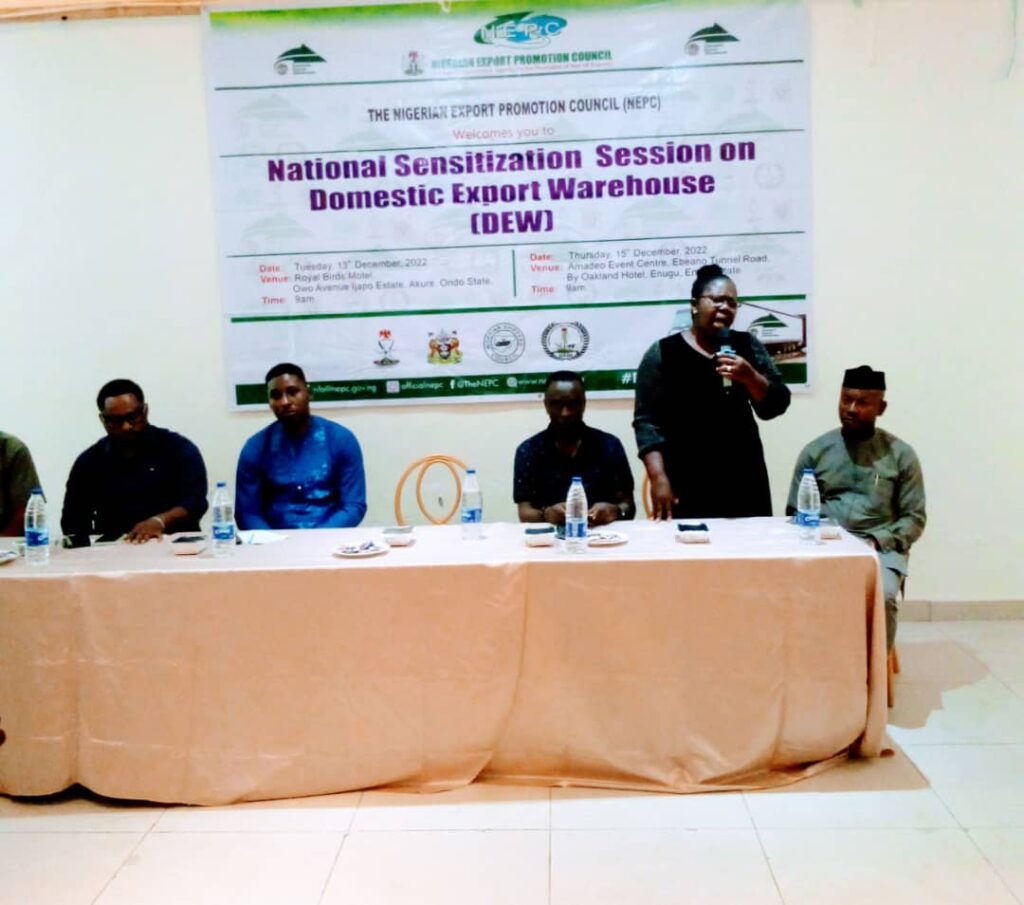Ben Ezechime, Enugu
The Nigerian Export Promotion Council (NEPC), says it has entered into partnership with the Nigeria Ports Authority (NPA), to facilitate easy movement of trucks at the ports.
Mr Afolabi Bello, Assistant Director, Project Development, NEPC Abuja, disclosed this in Enugu at a One-Day National Sensitisation Session on Domestic Warehouse.
He said that the partnership becomes necessary because most of NEPC export activities were done through the seaport which is within the domain of NPA.
Bello said that the only way to succeed in driving SMEs was to collaborate with some private and public sector organisations.
“If you want to succeed in driving SMEs, you need partnerships and collaborations with public and private sector organizations.
“Some of these organizations are into export regulatory while some are export facilitators,” he said.
According to him, most of the export activities of NEPC were carried out through the seaport, therefore, it became necessary to find means of facilitating easy access for trucks from NEPC warehouse.
“As you know, most of our exports, in fact, over 80 per cent, are done through the seaport, and export activities need timeline.
“So the synergy with NPA is to ensure that trucks from our domestic Warehouse can have direct port access.
“The synergy is to facilitate easy movement of trucks from our domestic Warehouse to the ports, instead of coming to queue endlessly at the ports.
He said that one of the major constraints to the growth of SMEs export activities was port congestion.
He also said that the council considered SMEs as a very important and critical part of growth of Nigerian economy.
“The SMEs are critical and crucial to our survival as a nation because they employ a large percentage of the working population and as you know they are also the engine of growth to the economy of the country.
“But, as you know, they face many challenges in exporting their products, especially because of the small nature of their businesses.
“So, we facilitate their businesses through regular training, sensitisation, loans, capacity building, business designs,” Bello said.
He said NEPC also trains SMEs on packaging and labeling as well as exposing them to foreign buyers.
“We also do certification for them. As we speak, we have done certification for over150 SMEs so that their products can meet the demands of the market,” he said
In the same vein, Mrs Esther Ikporah, NEPC, South-East Zonal Director, said that the training of SMEs on the development of non oil export was a continuous process.
“We will continue to train the SMEs, providing them with everything required to succeed as part of efforts to ensure that Nigerians embrace non-oil export.
“Today, you can see more participants, over a 100, who wish to be exporters, it is good for Nigeria as we pursue diversification of the economy,” she said.
Ikporah urged the people of the South-East zone to engage in non-oil export as a means of shoring up their economy.
A participant, Mrs Obianuju Okpo a licensed exporter said there was the need for the NEPC to build a central point for SMEs as an evacuation point.
“About 90 per cent of participants here cannot export, not to talk of having warehouse of their own.
“So, the government should encourage them by building a center, that can serve as export evacuation center,” she said.

